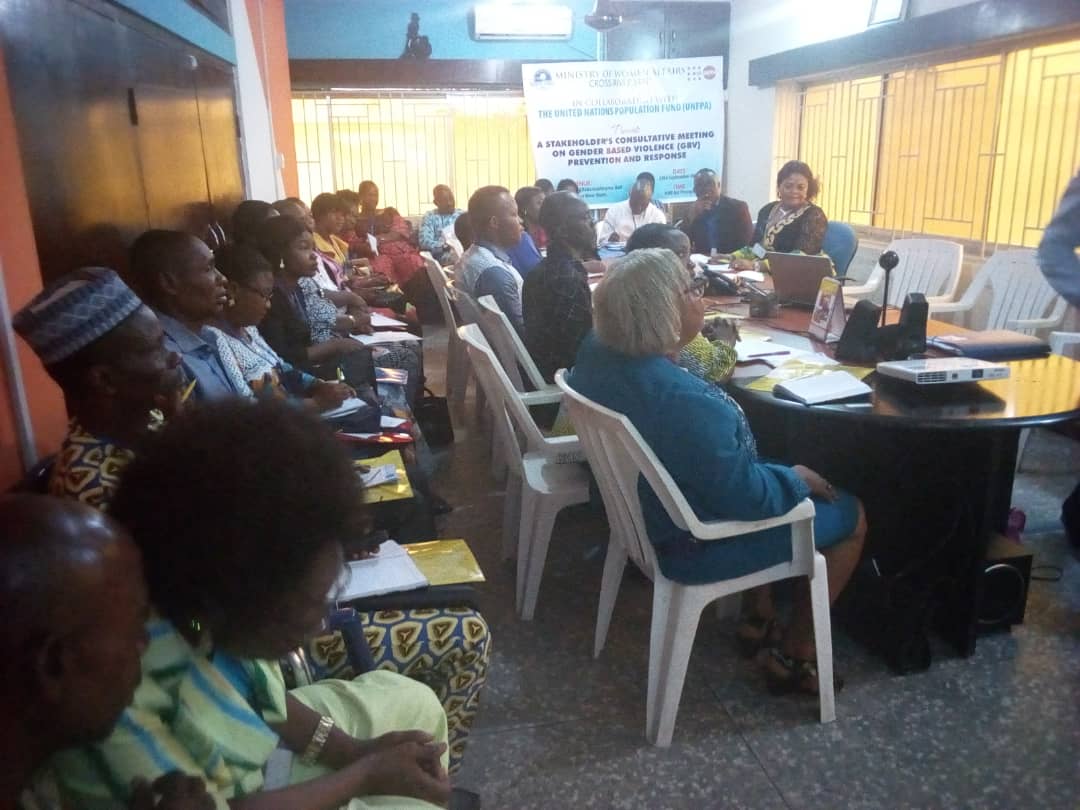By Elijah Ugani: Health Correspondent
At least 65.5 percent of women in Cross River State have experienced some form of physical violence since age 15 says the Canadian charity organisation, CUSO International.
The organisation’s gender expert attached to the United Nations Population Fund (UNFPA), Jacque Karungi disclosed this while making a presentation at a one day stakeholder’s consultative meeting on gender based violence (GBV) held in Calabar last week Friday.
“65.5 percent of women of reproductive age have experienced physical violence since the age of 15,,
Karungi said, adding that reproduction of women of child bearing of who have experienced sexual violence is 20 percent, spousal violence is high at 47.4 percent which is higher than the national average and south-south geopolitical zone average of 16 and 20 percent respectively.
Karungi also said that 46 percent of the women who have experienced violence never sought for help or told anyone about it.
The head, Calabar Office of the UNFPA, Mr. Keneth Ehuozuo who was represented by the Monitoring and Evaluation Specialist, Mr. Lanre Alabi in his remarks disclosed that a toll free line will be open to deal with GBV as the state has a prevalence of 47 percent.
“Cross River State has a prevalence of 47 percent gender based violence. The burden is high in Cross River State. This meeting is very timely, you are to protect the people; there will a toll free line, providing a referral, counseling to survivor of gender based violence,” he said, adding that: “We are not there yet, we have the child right act, Lagos State had an edict, when offenders are taken to court, they would be prosecuted, we will train victims, we will do our best to support our women who suffer this violence, we need a center where victims can walk in and talk freely about their challenges.”
He commended the ministry of women affairs for coordinating gender based response in the state and pointed out that there was need for a coordination mechanism in the state to be able to reach the 18 local government areas, multi-sectorial approach to the response services in terms of psychosocial support, data base, network, organizations providing services and where they are located, informal way of reporting violation and training.
And, the commissioner for women affairs, Stella Odey in her remarks disclosed that the state will open a gender based report center in Calabar to tackle issues of domestic violence against women in addition to the child rights commission already in place.
Odey who also disclosed that the state is working with the UNFPA to develop a gender policy to be sent to the State House of Assembly averred that the State “will ensure that this center is functional and appropriate services rendered to curb the menace against the girl child and women.”
She commended the support from the UNFPA noting that: “UNFPA has done so much in eradicating gender based violence in our communities.”
Also, she described the governor, Senator Ben Ayade as being “gender friendly,” maintaining that he has, “done so much to empower the women of Cross River State, if the woman is empowered, she would not be trampled, the state is against violation against the girl child, the ministry is willing and is ready to support any civil society organisation that is passionate about and ready to advocate for the right of the woman.”
It is unclear when the center will be opened but, it is expected to improve access to quality GBV prevention and response information and services; establish toll free and hot one services for GBV prevention and response; Improve institutional capacity for data management of GBV cases as well as establish effective GBV case management and referral services.
The implementation strategy as discussed in the meeting will include the establishment of pilot central public sector center to expand access to prevention; response and case management services; effective collaboration and information sharing between public and non-state actors to ensure synergy and avoid duplication of efforts and coordination by the women affairs ministry in line with its oversight functions.
The permanent secretary in the ministry, Mr. Freeman Ejom in his remarks said the state in collaboration with all stakeholders will draw, “a roadmap that will enable us to go the villages to sensitize our people,” and commended the UNFPA for opening its office to accommodate the stakeholders despite the ongoing industrial action at the time.
